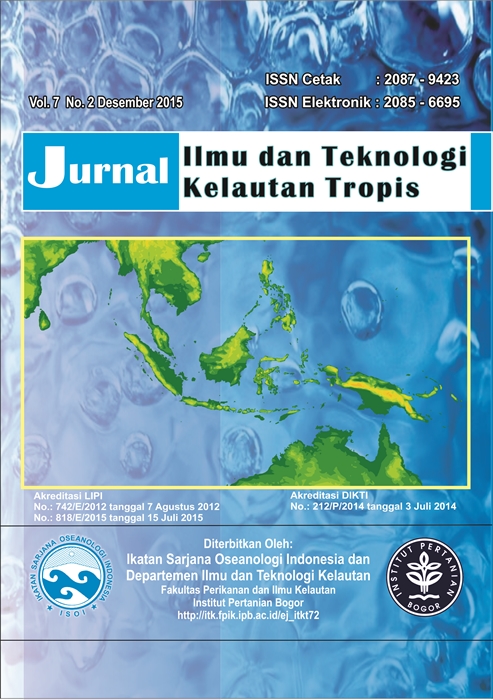ANTIBACTERIAL ACTIVITY ASSAY OF MANGROVE EXTRACTS AGAINST SALMONELLA TYPHI AND LISTERIA MONOCYTOGENES
Abstract
The antibacterial activities of mangrove species, Avicennia marina, Sonneratia caseolaris (collected from Teluk Payo, Banyuasin, South Sumatera), Ceriops tagal, Rizhopora apiculata, and Sonneratia alba (collected from Sadai, South Bangka) were screened against Salmonella typhi and Listeria monocytogenes by agar disk diffusion assays. Extractions were conducted using organic solvents (methanol, ethyl acetate, and acetone, subsequently). Most of the extracts tested showed potential antibacterial activity against both pathogens. The methanol extracts of the bark from S. alba and the fruit from A. marina showed particularly large inhibition zones (15 mm) against S. typhi. The acetone extract of S. alba leaves showed the largest inhibition zone (14 mm) when tested against L. Monocy-togenes. Further partial purifications of selected extracts which showed strong inhibition were performed by silica gel column chromatography using various eluent compositions with different polarities. The third fraction of methanol extract from S.alba leaves eluted with chloroform:methanol (1:5) resulted in a remarkably large inhibition zone (23 mm) against S. typhi. The third and seventh fractions of acetone extract from S. alba leaves eluted with ethyl acetate:methanol (7:3) resulted in a large inhibition zones (15 mm) against L. monocytogenes. In addition, the sixth fraction of methanol extract from A. marina fruit eluted with chloroform : methanol (6:4) resulted in the largest inhibition zone (17 mm) against L. monocytogenes. These results indicated that mangrove extracts could be developed as potential biomaterials for biopharmaceutical as well as biopreservation industries.
Keywords: antibacterial activity, mangrove, column chromatography
Authors
The author submitting the manuscript must understand and agree that the copyright of the article manuscript must be submitted/transferred to the Jurnal Ilmu dan Teknologi Kelautan Tropis. This work is licensed under the Creative Commons Attribution-ShareAlike 4.0 (CC BY-SA) International License in which the Author and Reader can copy and redistribute the material in any media or format, and remix, modify and build material for any purpose, but they must provide appropriate credit (citing articles or content), provide a link to the license, and indicate whether there is a change. If you mix, change, or create material, you must distribute your contribution under the same license as the original.


